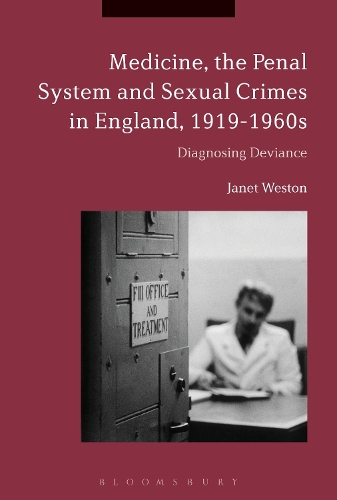
Medicine, the Penal System and Sexual Crimes in England, 1919-1960s: Diagnosing Deviance
(Paperback)
Available Formats
Publishing Details
Medicine, the Penal System and Sexual Crimes in England, 1919-1960s: Diagnosing Deviance
By (Author) Janet Weston
Bloomsbury Publishing PLC
Bloomsbury Academic
19th September 2019
United Kingdom
Classifications
Tertiary Education
Non Fiction
Crime and criminology
Sexual abuse and harassment
Social and cultural history
European history
General and world history
History and Archaeology
364.1530942
Physical Properties
Paperback
216
Width 153mm, Height 234mm
313g
Description
Sexual crime, past and present, is rarely far from the headlines. How these crimes are punished, policed and understood has changed considerably over the last century. From hormone injections to cognitive behavioural therapy, medical and psychological approaches to sexual offenders have proliferated. This book sets out the history of such theories and treatments in England. Beginning in the early 20th century, it traces the evolution of medical interest in the mental state of those convicted of sexual crime. As part of a broader interest in individualised responses to crime as a means to rehabilitation, doctors offered new explanations for some sexual crimes, proposed new solutions, and attempted to deliver new cures. From indecent exposure to homosexuality between men, from sadistic violence to thefts of underwear from washing lines, the interpretation and treatment of some sexual offences was thought to be complex. Of less medical interest, though, were offences against children, prostitution, and rape. Using a range of material, including medical and criminological texts, trial proceedings, government reports, newspapers, and autobiographies and memoirs, Janet Weston offers powerful insights into changing medico-legal practices and attitudes towards sex and health. She highlights the importance of prison doctors and rehabilitative programmes within prisons, psychoanalytically-minded private practitioners, and the interactions between medical and legal systems as medical theories were put into practice. She also reveals the extent and legacy of medical thought, as well as the limitations of a medical approach to sexual crime.
Reviews
As Weston points out, sources are scarce on the doctors, judges, and rehabilitation staff involved in sentencing and treating offenders, and records are essentially nonexistent when it comes to the deviants themselves and, especially, their victims. As a result, the sources are largely bureaucratic in nature. However, the author is adept at interpreting them to show nuanced trends in the medico-legal definition of deviance. Summing Up: Recommended. Graduate students/faculty/professionals. * CHOICE *
An important corrective to existing scholarship on the history of psychiatry and crime that focuses primarily on categorizing sexual difference or the insanity defense. Seeing the history from the perspective of rehabilitating sex offenders gives us the chance to consider more thoroughly how and why physicians regarded some sex offenses as pathological but others not, further revealing how deeply rooted ideas about gender roles shaped medical thought. * Isis Journal *
Using a range of material, including medical and criminological texts, trial proceedings, government reports, newspapers, and autobiographies and memoirs, Janet Weston offers powerful insights into changing medico-legal practices and attitudes towards sex and health. * History of Psychiatry *
Weston's intriguing book brings a much-needed nuanced analysis to a topic exploring the prospects for rehabilitating sexual offenders shrouded in controversy and misconceptions. Weston draws on insights from the history of sexuality, the history of mental health, and the history of prisons to show that efforts in 20th century England, while not uniform, nevertheless provided clinicians there with the opportunity to expand their reach within the criminal justice system. Historians of medicine, crime, and sexuality will all want to consult this insightful study. * Greg Eghigian, Professor of History, Pennsylvania State University, USA *
For too long historians of psychiatry have focused separately on topics such as the construction of sexological categories, the spread of psychoanalysis, the uses of the M'Naghten Rules. Finally, Janet Weston has moved us on to a history of forensic sexual psychiatry that draws all of these fields together. Her book is meticulously researched and persuasive in its arguments about the formation of sexual criminals - homosexuals, sadists, exhibitionists, pedophiles - their incarceration and treatments. This ground-breaking history tells how the State enters the lives and minds of individuals whose sexual desires are outside of accepted norms. * Ivan Crozier, Associate Professor of History, University of Sydney, Australia *
Author Bio
Janet Weston is Research Fellow at the Centre for History in Public Health, London School of Hygiene and Tropical Medicine, UK.
